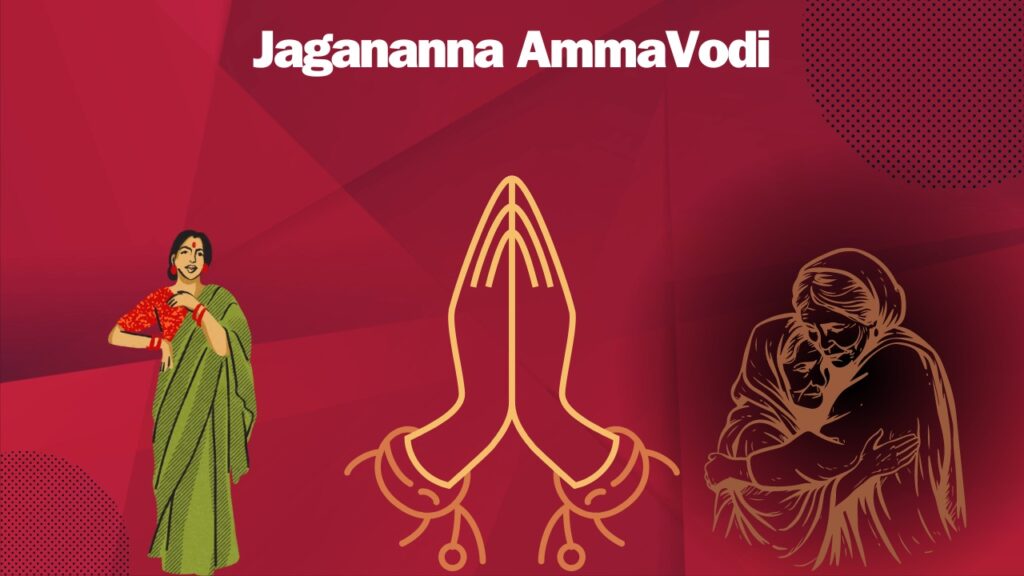Table of Contents
Introduction of Jagananna AmmaVodi 2023 || ఇంట్రడక్షన్ అఫ్ జగనన్న అమ్మవొడి ౨౦౨౩
The Jagananna AmmaVodi yojana represents a significant initiative introduced by the government of Andhra Pradesh, India, under the leadership of Chief Minister Y.S. Jagan Mohan Reddy. This welfare program is tailored to empower families and advance education across the state.
At its core, Jagananna Amma Vodi aims to alleviate financial burdens on families, especially those from disadvantaged backgrounds, by providing crucial support to mothers or guardians of school-going children. Through an annual stipend of Rs. 15,000 per child, the scheme encourages regular school attendance and promotes educational opportunities for every child.
More than merely a financial assistance program, Jagananna Amma Vodi embodies a holistic approach to social and educational reform. By empowering mothers as key agents of change within their households, the scheme fosters financial autonomy and decision-making capabilities. This direct transfer of funds to their bank accounts ensures transparency and empowers women to make informed choices for the betterment of their families.
The implementation of Jagananna Amma Vodi reflects the government’s commitment to equitable access to education and socio-economic development. By enhancing school enrollment, reducing dropout rates, and fostering a conducive learning environment, the scheme lays the groundwork for a more inclusive and prosperous future for all.
In essence, the Jagananna AmmaVodi 2023 stands as a symbol of proactive governance and human-centric policy-making, dedicated to uplifting communities and realizing the potential of every child across Andhra Pradesh.
Benefits of the Jagananna AmmaVodi Yojana 2020 || బెనిఫిట్స్ అఫ్ ది జగనన్న అమ్మవొడి యోజన ౨౦౨౦
- Financial Assistance: The Jagananna AmmaVodi 2023 Yojana provides financial assistance to mothers or guardians of school-going children, offering Rs. 15,000 per child annually. This support aids families in meeting educational expenses such as school fees, uniforms, and books.
- Increased School Enrollment: By incentivizing regular school attendance through financial aid, the yojana contributes to increased school enrollment rates. Families are more likely to send their children to school when they receive monetary support, ensuring more children have access to education.
- Reduced Dropout Rates: Financial constraints often lead to children dropping out of school prematurely. However, with the support of the Jagananna AmmaVodi 2023 Yojana, families can better afford to keep their children in school until completion, leading to lower dropout rates and higher educational attainment.
- Empowerment of Women: The direct transfer of financial assistance to the bank accounts of mothers or guardians empowers women within households. It enhances their financial independence and decision-making authority, leading to greater autonomy and empowerment.
- Poverty Alleviation: Targeting families from economically disadvantaged backgrounds, the yojana plays a crucial role in poverty alleviation. Providing financial aid for education helps break the cycle of poverty by enabling children to access better educational opportunities, thereby increasing their chances of socio-economic mobility.
- Improved Education Quality: Increased demand for education resulting from the yojana can lead to improvements in the overall quality of education provided by schools. Schools may strive to meet the needs of a growing student population, resulting in enhancements to educational facilities and teaching standards.
- Long-term Societal Benefits: Education is a catalyst for individual empowerment and societal development. By investing in the education of children, the Jagananna AmmaVodi 2023 Yojana contributes to the creation of a more educated and skilled workforce, leading to long-term economic growth and social progress.

Eligibility Criteria Of Jagananna AmmaVodi 2023 Yojana || ఎలిజిబిలిటీ క్రైటీరియా అఫ్ జగనన్న అమ్మవొడి ౨౦౨౩ యోజనా
- Residence: The mother/guardian must be a resident of Andhra Pradesh.
- Child’s Education: The child/children of the mother should be studying in Class 1st to Class 12th.
- School/College Recognition: The school/college in which the child is admitted/enrolled should be a recognized Government, Private Aided, and Private Unaided School/Jr. College or Residential School/Jr. College in the state of Andhra Pradesh.
- Applicable Period: The scheme is applicable from the Academic Year 2019-20.
- Income Criteria: The Total Family Income should be less than ₹10,000/- per month in rural areas and ₹12,000/- per month in urban areas (Below Poverty Line – BPL).
- Government Employment: No family member of the child should be a Government Employee or Government Pensioner, except for families of sanitary workers.
- Vehicle Ownership: The family of the applicant should not own a four-wheeler, except for Taxis, Tractors, and Autos.
- Electricity Consumption: The monthly electricity consumption of a family dwelling unit (owned/rented) of the applicant should be below 300 units (six months average).
- Income Tax: No family member of the applicant should be an income tax payer.
- Land Area: The land under the municipal area should be less than 1000 sq. ft.
- Attendance Requirement: The attendance of the child should be at least 75%.
These criteria ensure that the benefits of the scheme reach the intended beneficiaries and help in promoting education among economically disadvantaged families in Andhra Pradesh.
Documents Required Jagananna AmmaVodi 2023 Yojana || డాకుమెంట్స్ రిక్విరెడ్ జగనన్న అమ్మవొడి ౨౦౨౩ యోజనా
- Aadhaar Card: The Aadhaar Card serves as a primary identification document.
- White Ration Card: The White Ration Card is used as proof of eligibility for various government schemes.
- Proof of Address: Documents such as Aadhaar Card, Voter ID Card, or Electricity Bill are accepted as proof of address.
- Name of the school: The name of the school where the child is currently enrolled.
- Bank account details: Bank account details of the mother or guardian are required for the direct transfer of financial assistance.
- Passport size photo: A passport-size photograph of the mother or guardian is necessary for documentation purposes.
- School’s identity card: The school’s identity card confirms the student’s enrollment in the respective school and is used for verification purposes.
Application Process Of Jagananna AmmaVodi 2023 Yojana || అప్లికేషన్ ప్రాసెస్ అఫ్ జగనన్న అమ్మవొడి ౨౦౨౩ యోజనా
It’s Application process is only offline:-
Step 1: The School Headmaster or Inter College Principal submits student details using a provided proforma, including Name, age, parent name, Caste (General, SC, ST, BCs, Minority), Disabled Children, etc. This data serves as the primary source of information.
Step 2: The submitted details undergo cross-validation using a 6-step check and are compared with Childinfo/UDISE data and other records from Civil Supplies and related departments. Certification of these details for payment is done by the immediate inspecting officer of the institution.
Step 3: A Provisional List of Eligible Candidates is publicly displayed in the village/ward secretariat for Social Audit. Any candidates found ineligible during this audit are listed along with the reasons for their ineligibility. Communication regarding rejection is sent to the respective candidates.
Step 4: The final list of Eligible Candidates is prepared by the Welfare Education Assistant or Ward Education & Data Processing Secretary. This list is then approved by the District Collector. The e-KYC of the mother is completed through Biometric authentication by Volunteers, Welfare Education Assistants, or Ward Education & Data Processing Secretaries.
Step 5: Subsequently, the concerned District Educational Officers, District Vocational Educational Officer, or Regional Educational Officer for Intermediate Education release financial assistance to the beneficiaries’ savings bank accounts online.
Step 6: Volunteers, Welfare Education Assistants, or Ward Education & Data Processing Secretaries obtain acknowledgment from mothers regarding the receipt of payment through biometric authentication.
Jagananna AmmaVodi 2023 Yojana online status of your application
- Visit the official website of the Jagananna AmmaVodi 2023 Yojana. You can usually find this on the official website of the Andhra Pradesh government or the Department of School Education.
- Look for the “Jagananna AmmaVodi” section on the website. There may be a specific portal or link dedicated to the scheme.
- Once you’re on the Jagananna AmmaVodi portal, navigate to the section for checking application status or online services.
- You may need to log in using your credentials or provide your application reference number and other details to access the status of your application.
- After logging in, you should be able to view the current status of your Jagananna AmmaVodi application. This may include whether it’s under review, approved, or any other relevant updates.
- If you encounter any issues or have questions about the status displayed, there may be contact information provided on the website for further assistance. You can reach out to the relevant authorities for clarification or support.
It’s essential to use the official website and portals provided by the government to check your application status to ensure security and reliability.
Frequently Asked Questions
What is the Jagananna AmmaVodi 2023 Yojana ?
The Jagananna AmmaVodi 2023 Yojana is a welfare scheme initiated by the government of Andhra Pradesh to provide financial assistance to mothers or guardians of school-going children.
Who is eligible to benefit from the Yojana?
Mothers or guardians of children studying in classes 1st to 12th in recognized government, private aided, private unaided, or residential schools in Andhra Pradesh are eligible. The family’s total income should be below ₹10,000 per month in rural areas and ₹12,000 per month in urban areas (Below Poverty Line – BPL).
How much financial assistance is provided under the scheme?
Eligible beneficiaries receive financial assistance of ₹15,000 per child annually.
What documents are required for enrollment in the scheme?
Documents such as Aadhaar Card, White Ration Card, Proof of Address (Aadhaar Card, Voter ID Card, Electricity Bill, etc.), school’s identity card, bank account details of the mother or guardian, and a passport-size photograph of the mother are required.
How can I apply for the Jagananna AmmaVodi 2023 Yojana?
The application process typically involves submitting the necessary documents to the school authorities, who then verify and forward them for enrollment.
When does the scheme start and end?
The scheme was launched in the academic year 2019-20 and continues to be implemented as an ongoing initiative.
How is the financial assistance distributed?
The financial assistance is directly credited to the bank accounts of the eligible mothers or guardians.
What is the role of Social Audit in the scheme?
Social Audit involves displaying a Provisional List of Eligible Candidates in village/ward secretariats, allowing for public scrutiny. Ineligible candidates are identified, and reasons for their ineligibility are recorded.
How are the final beneficiaries selected?
The final list of eligible candidates is prepared by designated officials after cross-validation of submitted data and approval by the District Collector.
What measures are taken to ensure transparency and accountability?
The scheme involves various checks and certifications at different stages, including cross-validation of data, Social Audit, and approval by district-level authorities, to ensure transparency and accountability in the distribution of financial assistance.

